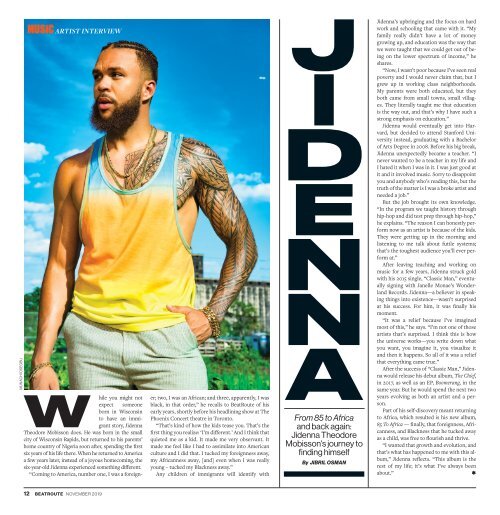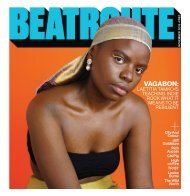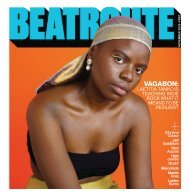BeatRoute Magazine ON Edition - November 2019
BeatRoute Magazine is a music monthly and website that also covers: fashion, film, travel, liquor and cannabis all through the lens of a music fan. Distributed in British Columbia and Alberta, Ontario edition coming Thursday, October 4, 2019. BeatRoute’s Alberta edition is distributed in Calgary, Edmonton, Banff and Canmore. The BC edition is distributed in Vancouver, Victoria and Nanaimo. BeatRoute (AB) Mission PO 23045 Calgary, AB T2S 3A8 E. editor@beatroute.ca BeatRoute (BC) #202 – 2405 E Hastings Vancouver, BC V5K 1Y8 P. 778-888-1120
BeatRoute Magazine is a music monthly and website that also covers: fashion, film, travel, liquor and cannabis all through the lens of a music fan. Distributed in British Columbia and Alberta, Ontario edition coming Thursday, October 4, 2019. BeatRoute’s Alberta edition is distributed in Calgary, Edmonton, Banff and Canmore. The BC edition is distributed in Vancouver, Victoria and Nanaimo. BeatRoute (AB) Mission PO 23045 Calgary, AB T2S 3A8 E. editor@beatroute.ca BeatRoute (BC) #202 – 2405 E Hastings Vancouver, BC V5K 1Y8 P. 778-888-1120
You also want an ePaper? Increase the reach of your titles
YUMPU automatically turns print PDFs into web optimized ePapers that Google loves.
MUNACH IOSEGBU<br />
MUSiC ARTIST INTERVIEW<br />
W<br />
hile you might not<br />
expect someone<br />
born in Wisconsin<br />
to have an immigrant<br />
story, Jidenna<br />
Theodore Mobisson does. He was born in the small<br />
city of Wisconsin Rapids, but returned to his parents’<br />
home country of Nigeria soon after, spending the first<br />
six years of his life there. When he returned to America<br />
a few years later, instead of a joyous homecoming, the<br />
six-year-old Jidenna experienced something different.<br />
“Coming to America, number one, I was a foreigner;<br />
two, I was an African; and three, apparently, I was<br />
black, in that order,” he recalls to <strong>BeatRoute</strong> of his<br />
early years, shortly before his headlining show at The<br />
Phoenix Concert theatre in Toronto.<br />
“That’s kind of how the kids tease you. That’s the<br />
first thing you realize: ‘I’m different.’ And I think that<br />
quieted me as a kid. It made me very observant. It<br />
made me feel like I had to assimilate into American<br />
culture and I did that. I tucked my foreignness away,<br />
my Africanness away, [and] even when I was really<br />
young – tucked my Blackness away.”<br />
Any children of immigrants will identify with<br />
J I<br />
D E<br />
N<br />
N A<br />
From 85 to Africa<br />
and back again:<br />
Jidenna Theodore<br />
Mobisson's journey to<br />
finding himself<br />
By JIBRIL OSMAN<br />
Jidenna’s upbringing and the focus on hard<br />
work and schooling that came with it. “My<br />
family really didn’t have a lot of money<br />
growing up, and education was the way that<br />
we were taught that we could get out of being<br />
on the lower spectrum of income,” he<br />
shares.<br />
“Now, I wasn’t poor because I’ve seen real<br />
poverty and I would never claim that, but I<br />
grew up in working class neighborhoods.<br />
My parents were both educated, but they<br />
both came from small towns, small villages.<br />
They literally taught me that education<br />
is the way out, and that’s why I have such a<br />
strong emphasis on education.”<br />
Jidenna would eventually get into Harvard,<br />
but decided to attend Stanford University<br />
instead, graduating with a Bachelor<br />
of Arts Degree in 2008. Before his big break,<br />
Jidenna unexpectedly became a teacher. “I<br />
never wanted to be a teacher in my life and<br />
I hated it when I was in it. I was just good at<br />
it and it involved music. Sorry to disappoint<br />
you and anybody who’s reading this, but the<br />
truth of the matter is I was a broke artist and<br />
needed a job.”<br />
But the job brought its own knowledge.<br />
“In the program we taught history through<br />
hip-hop and did test prep through hip-hop,”<br />
he explains. “The reason I can honestly perform<br />
now as an artist is because of the kids.<br />
They were getting up in the morning and<br />
listening to me talk about futile systems;<br />
that’s the toughest audience you’ll ever perform<br />
at.”<br />
After leaving teaching and working on<br />
music for a few years, Jidenna struck gold<br />
with his 2015 single, “Classic Man,” eventually<br />
signing with Janelle Monae’s Wonderland<br />
Records. Jidenna—a believer in speaking<br />
things into existence—wasn’t surprised<br />
at his success. For him, it was finally his<br />
moment.<br />
“It was a relief because I’ve imagined<br />
most of this,” he says. “I’m not one of those<br />
artists that’s surprised. I think this is how<br />
the universe works—you write down what<br />
you want, you imagine it, you visualize it<br />
and then it happens. So all of it was a relief<br />
that everything came true.”<br />
After the success of “Classic Man,” Jidenna<br />
would release his debut album, The Chief,<br />
in 2017, as well as an EP, Boomerang, in the<br />
same year. But he would spend the next two<br />
years evolving as both an artist and a person.<br />
Part of his self-discovery meant returning<br />
to Africa, which resulted is his new album,<br />
85 To Africa — finally, that foreignness, Africanness,<br />
and Blackness that he tucked away<br />
as a child, was free to flourish and thrive.<br />
“I wanted that growth and evolution, and<br />
that’s what has happened to me with this album,”<br />
Jidenna reflects. “This album is the<br />
rest of my life; it’s what I’ve always been<br />
about.” ,<br />
12 BEATROUTE NOVEMBER <strong>2019</strong>

















